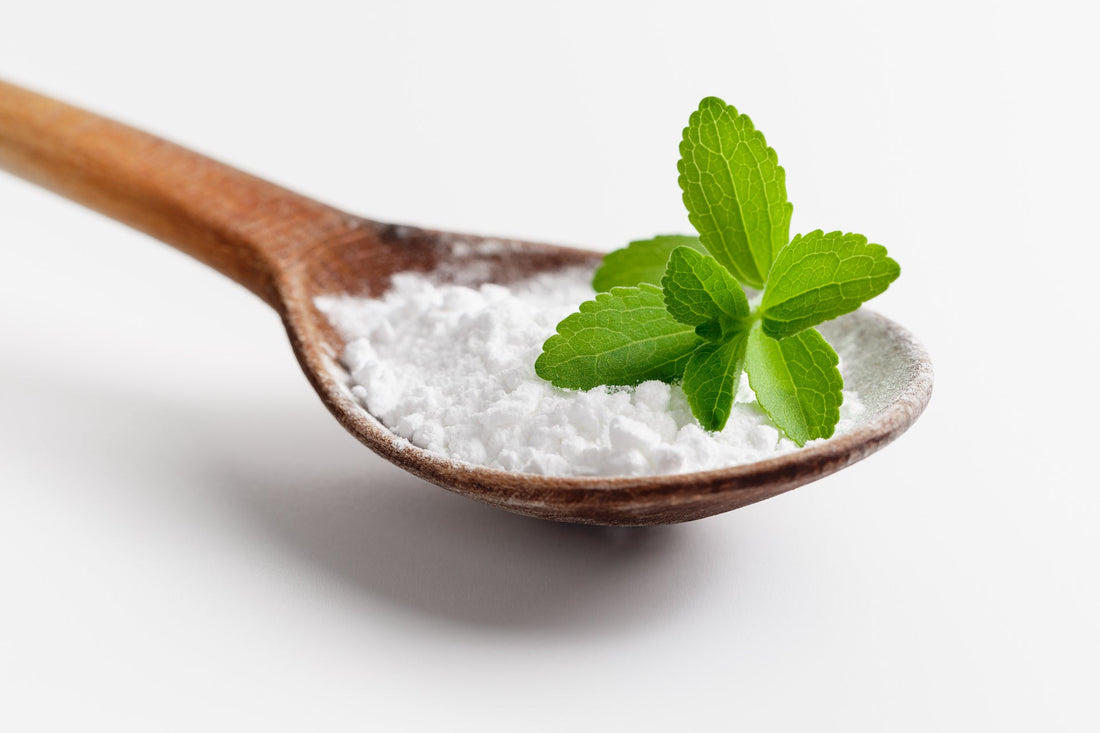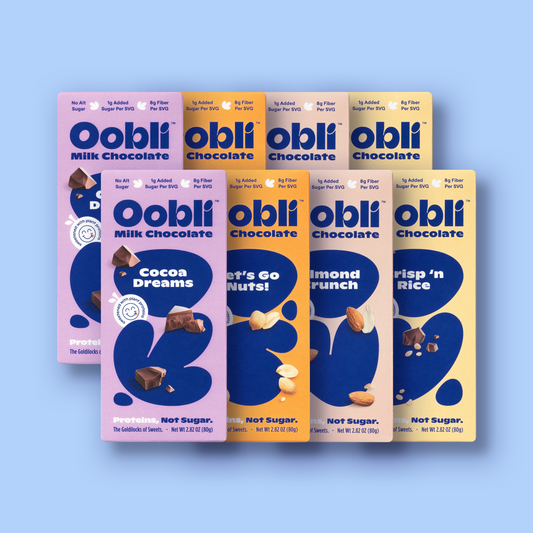Stevia, a popular natural sweetener that flew to the top of the charts in the 1980s, is supposed to be a healthier alternative to traditional sugar. There’s just one problem: it doesn't taste like sugar!
The intensely, soapy sweetness is followed by a really unpleasant aftertaste that makes it difficult to enjoy (or even taste) anything that’s sweetened using stevia.
So, what does stevia taste like, exactly, and why does stevia taste so bad? Today, we’re going to take a look at the taste of stevia to give you some answers. We’ll describe it, discuss why does stevia taste so bad, take a look at how to make stevia taste better, and hit you with some alternatives that don’t actually stop you from enjoying your food.
First, What is Stevia Exactly?
Stevia is a compound that’s extracted from the Stevia rebaudiana plant, which is native to South America and most commonly found in Brazil and Paraguay. It has been used for centuries by indigenous communities as a natural sweetener and medicinal herb. Stevia gained global attention for its intense sweetness without calories, making it an appealing sugar substitute for those seeking a healthier alternative.
Stevia is available in various forms including whole leaves, dried leaves, powdered extracts, and liquid extracts, though not all forms of stevia are considered safe by the FDA. The powdered and liquid extracts are the most commonly used forms in food and beverage applications due to their convenience and concentrated sweetness.
Stevia is used as a sugar substitute in a wide range of products - it’s all around you. There’s a good chance you’ll find stevia in your diet soda, cookies, sauces, and any “healthy” desserts lurking in your pantry.
What Does Stevia Taste Like?
So, what does stevia taste like? You’ve probably tasted stevia without realizing or wondered what that “off” aftertaste was but not thought too much about it. Let’s discuss the taste of stevia in more detail.
Does Stevia Taste Like Sugar?
Does stevia taste like sugar? Not exactly. While both sugar and stevia provide sweetness, they have distinct taste characteristics. Stevia's sweetness is often described as intensely sweet, and is even more potent than sugar. In fact, stevia's sweetness can be 200 to 400 times greater than sucrose (table sugar).
When it comes to other taste qualities, stevia differs from sugar. Stevia has a slightly herbal or licorice-like undertone, which is more pronounced in some stevia extracts or brands than others. Does stevia taste like sugar when it’s added to food and drinks? Unfortunately not. Stevia leaves a disgusting, lingering aftertaste that many people describe as bitter or metallic.
Does Stevia Taste Good?
Personally, I hate the taste of stevia. I find it has a really unpleasant, bitter aftertaste, and I can instantly tell when something has been sweetened with stevia. While many people agree, some people don’t find the taste of stevia quite as off-putting, and can still enjoy foods that contain stevia.
What does stevia taste like when it’s added to food and beverage products? Stevia’s aftertaste can be so intense that often, foods and (especially) beverages containing stevia are actually sweetened with other sweeteners, like aspartame or erythritol.
Sometimes, they even have to add actual, real sugar to these foods to cover up the disgustingly bitter aftertaste of stevia! So, if you’re wondering how to make stevia taste better, the only answer is to mask its awful taste with other sweeteners.
One thing that’s certain is that nobody actually enjoys the taste of stevia. People either really can’t stand it, or tolerate it because they would rather experience a weird aftertaste than eat foods containing high levels of sugar. Surely there’s a better way?!
Why Does Stevia Taste So Bad?
Do you ever crack open a diet soda, take the first sip, and find yourself asking why does stevia taste so bad? We’ve all been there. The taste of stevia is due to compounds called steviol glycosides. The main steviol glycoside, stevioside, delivers most of stevia's sweetness. However, the minor steviol glycosides, such as rebaudioside A, contribute to the distinct aftertaste.
Stevia’s bitter, metallic, licorice-like aftertaste is due to the interaction between the minor steviol glycosides and taste receptors on the tongue. While the sweet taste receptors detect the intense sweetness of stevia, the minor steviol glycosides simultaneously activate our bitter taste receptors.
This simultaneous stimulation of sweet and bitter receptors gives rise to the characteristic aftertaste associated with stevia.
I Hate the Taste of Stevia…Is There an Alternative Worth Trying?
If you’re thinking, I hate the taste of stevia but need a low-calorie sugar alternative, you’re not alone! Let’s take a look at the other options out there.
Other Artificial Sweeteners
Many people turn to other artificial sweeteners, like aspartame or sucralose, which have also gained popularity as sugar substitutes due to their low or zero-calorie content. However, they come with their own set of concerns.
Some people find artificial sweeteners to have a distinct chemical taste or an overly sweet flavor that doesn't resemble the taste of sugar at all. Plus, there have been debates and controversies regarding their safety and potential health effects.
Aspartame has been linked with migraines and headaches, and possibly even certain types of cancer. Sucralose may have a negative impact on gut health, and could even lead to conditions like IBS or Chron’s disease.
While regulatory authorities have deemed them safe for consumption within recommended limits, it's understandable that you may want to seek alternatives with a more natural profile.
Introducing a More Natural Alternative: Sweet Proteins
If you want to avoid the unpleasant taste of stevia and the potential health risks of artificial sweeteners, sweet proteins are the answer you’ve been looking for! Instead of sugars, these compounds are proteins that deliver a huge burst of sweetness without calories, health risks, or a disgusting aftertaste.
These incredible proteins are naturally found in certain exotic fruits, like the West African Oubli fruit. They’re up to 5,000 times sweeter than sugar but contain no calories and don’t impact your blood sugar levels. Instead of health concerns like migraines, IBS, or even cancer, there are actually benefits of sweet proteins like antioxidants and anti-inflammatory properties.
So, how are sweet proteins made, and can sweet proteins be used as a sugar substitute? Here at Oobli, we’ve found a way to harness the power of sweet proteins and add them to food and drink products for the first time! Using a fermentation process that’s similar to the production of beer, wine, and cheese, we produce exactly the same proteins found in tropical fruits.
You can try our sweet proteins for yourself - the taste will amaze you and you’ll never turn back to artificial sweeteners. Our sweet iced teas and indulgent dark chocolate bars are made with the power of sweet proteins, and just a handful of other normal, natural ingredients. They’re healthy, natural, safe, and 100% guilt-free. And most importantly, you can avoid the nasty taste of stevia!
Bringing Our Conversation on the Taste of Stevia to a Close
Unfortunately, we can’t teach you how to make stevia taste better because it’s simply impossible. The only option is to mask its horrible aftertaste with other artificial sweeteners or sugar, which seems pretty pointless.
Luckily, it’s not all bad news! Sweet proteins offer the perfect solution. These magical compounds can sweeten our food and drink products without calories, weird aftertastes, or any of the health concerns that come with artificial sweeteners. Natural is always best!
Enjoy sweetness without the guilt - shop Oobli today!




